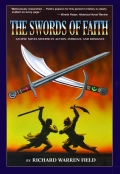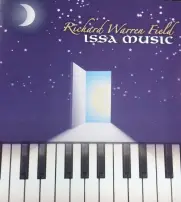The Pillars of the Earth – Comments on Episode One July 24, 2010
Posted by rwf1954 in historical fiction, Ken Follette, television commentary, The Pillars of the Earth, Uncategorized.Tags: commentary, comments, historical fiction, Ken Follette, television, The Pillars of the Earth
trackback
(Richard Warren Field wrote the award-winning novel,
The Swords of Faith. Read why this book will make a great movie.)
Viewers of “The Pillars of the Earth” mini-series: consider that the lines have been drawn—the good versus the bad—immediately, sharply, and more quickly and decisively than in The Pillars of the Earth novel. Prior Philip, Tom Builder, Ellen, Jack, Aliena and her brother Richard all line up on the good side of the ledger. Waleran Bigod, William Hamleigh and his parents, Remigius, and Alfred (Tom Builder’s son) line up on the bad side. Also, put Maud/Matilda and her faction on the good side of that ledger, and Stephen on the bad one. The lines are drawn for the remaining episodes, with conflict and subconflicts bubbling among and between these characters. The stage is set for six more hours of rollicking entertainment.
The first episode appears to be largely faithful to the novel (see my synopsis of The Pillars of the Earth at my website), with some notable exceptions which I will discuss below. It appeared to me that the changes were made for the obvious aims of either sharpening conflicts, heightening suspense, and/or increasing visual interest. (In my opinion, most of these changes worked well.)
Notes on changes to the novel:
- The old prior of Kingsbridge confesses his complicity in the death of an innocent man to Philip instead of Remigius. I suspect this will have significant implications for the story down the line. Philip does not have this information in the novel.
- Agnes gives birth to her son in the forest at the same time Maud/Matilda gives birth to her son Henry at or close to the court of Henry I, with vivid cross-cutting between the birth scenes. (In fact, Henry was born in France in 1133, five years before this scene is set.)
- The scene with Tom Builder abandoning his just-born son has some slight differences which I found very effective. Tom Builder appears to believe the boy will join his mother in Heaven, and figures that the cold night will be an easier death than slow starvation with his destitute family; Tom figures the baby boy will drift off to sleep, and off to Heaven. This emphasizes how religious faith dominated lives during this period of history, and makes Tom a little more sympathetic for what seems to be a callous, heinous act.
- Ellen seems drawn to Tom Builder, and seeks him out, because he is a master builder, and she believes her son could excel in that discipline with the right tutelage.
- Ellen and Jack also do not jump into a quick marriage (as they do in the novel), right after Agnes dies giving birth. This is another good choice, since Tom is supposed to be a sympathetic character, and marrying another woman twenty-four hours after his wife dies seems a cold deed, though in the novel it is understandable, given the desperate circumstances.
- Waleran Bigod presents a problem. He is supposed to be just a little older than Philip. But a much older actor, the great Ian McShane, plays him. This makes Bigod seem to be an aging figure, already close to power.
- In the novel, Waleran Bigod starts off almost as if he might be an ally of Philip’s, and we see him as a schemer, but aren’t sure on which side of the good/bad ledger he will settle. In the mini-series, his basic nature is apparent immediately. There is a clear implication that he poisons the presiding bishop, clearing the way for his succession to the bishop’s post, showing his nature clearly and immediately.
- The biggest departure from the plot in the first episode, and the one that I think works the least effectively, is the accusation that Ellen is a witch. She seems to delight in this, antagonizing the powers-that-be, even when on the verge of execution. She stabs Waleran Bigod with a smuggled weapon and flees the priory, all in apparent collaboration with Prior Philip (which is at odds with his pious nature). This line of plot development tracks roughly, and could provide problems later in the mini-series. Peeing in front of the bishop, then stabbing him, are not actions that can be easily excused. This will make it difficult for Ellen to return to the priory with any credibility. It is not realistic that such actions will be forgiven.
- There is also more dramatic information given about the secret surrounding Jack’s father’s death, with flashbacks dramatizing the circumstances and bringing in this element in more quickly and with more intensity than in the novel. Also, the curse Ellen delivers at Jack’s father’s execution, to “a knight, a monk and a priest,”—unidentified in the mini-series, as well as in the novel, heightening the mystery—is more specific for each one, making the curse more dramatic and intriguing. There is nothing like a secret, and an ominous devastating prophecy for the future for unknown parties, to drive interest. I found this deviation to be perhaps the most effective adjustment to the story.
- In a brief scene, there is a weird implication of some sort of incestuous obsession between William Hamleigh and his mother. This is downright creepy, and not necessary. William and his parents are evil enough without this weirdness thrown in.
On the history, the mini-series is clearly unsympathetic to Stephen, more sympathetic to Maud/Matilda. Stephen is depicted as an insincere conniver, usurping a position he has previously promised not to claim. Follette’s handling of the history, it seems to me, was more balanced between these two contenders. There is also an implication in the mini-series that the birth Maud/Matilda’s son Henry motivated Henry I to name Maud/Matilda as his heir. In fact, he had obtained a commitment to Maud from his barons a decade earlier, before she even married her son Henry’s father, Geoffrey Plantagenet.
I welcome comments from any readers more familiar with the history (an on anything else on “The Pillars of the Earth” mini-series).
I’ll be back commenting on Episode Two next Saturday.






Hello, I found your comments very interesting. I just finished reading the book recently and have begun watching the miniseries on Netflix. Like most film or tv adaptations, it’s not as good as the book, but still, it’s fun to watch. I’m only on episode 3, but so far I agree with you about Ellen and the witch accusation – it’s doesn’t work with the story. I also thought it was interesting that Earl Bartholomew is portrayed as a much nicer guy than the book. Oh well, it seems to work… My blog site is http://www.coldread.wordpress.com if you’re interested in reading my review of the book…